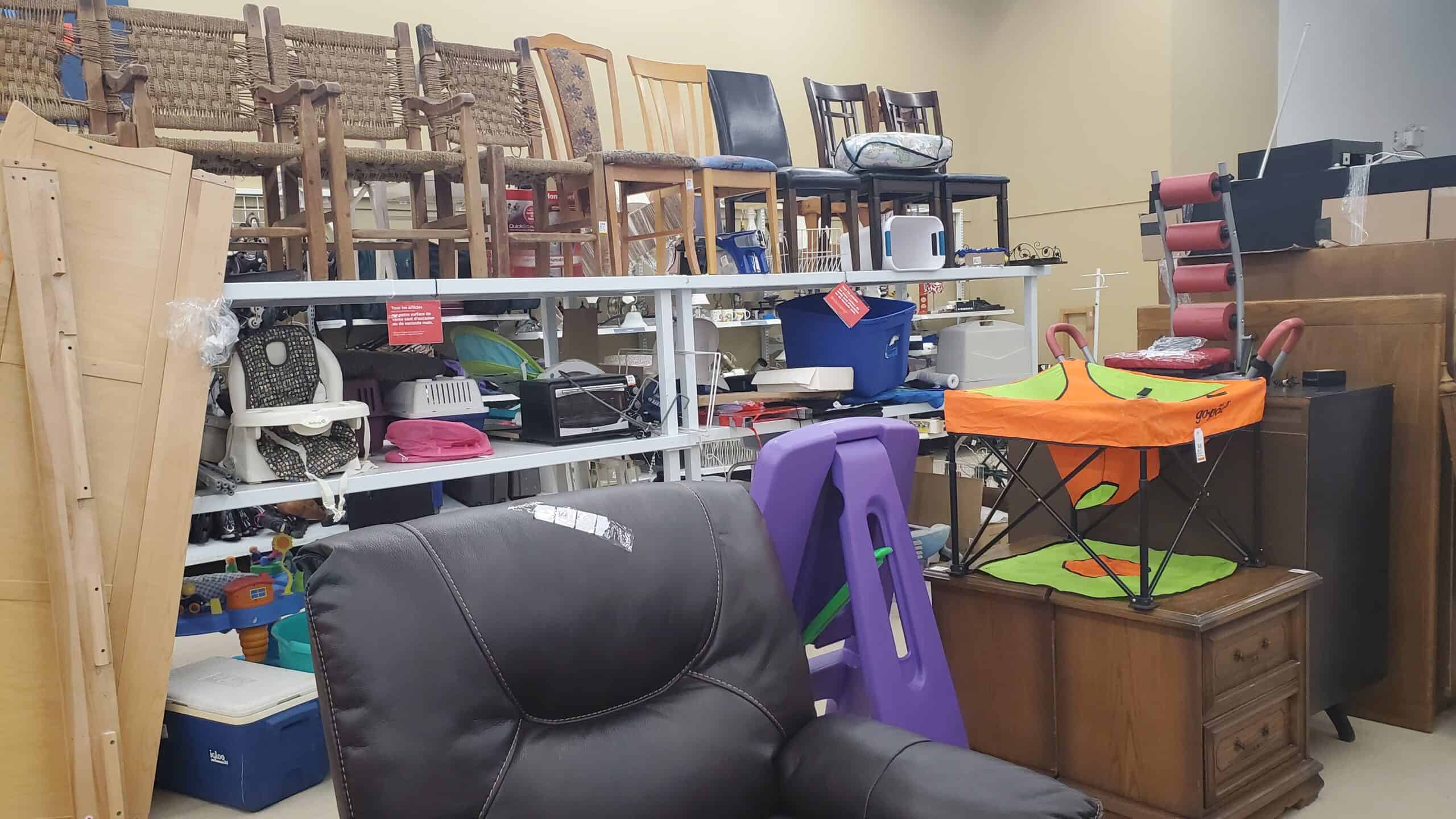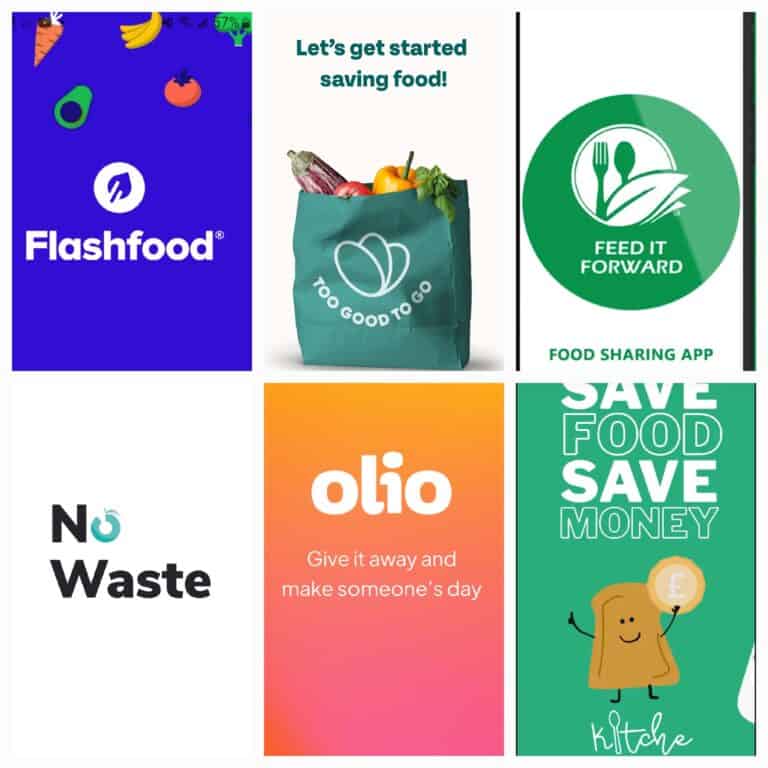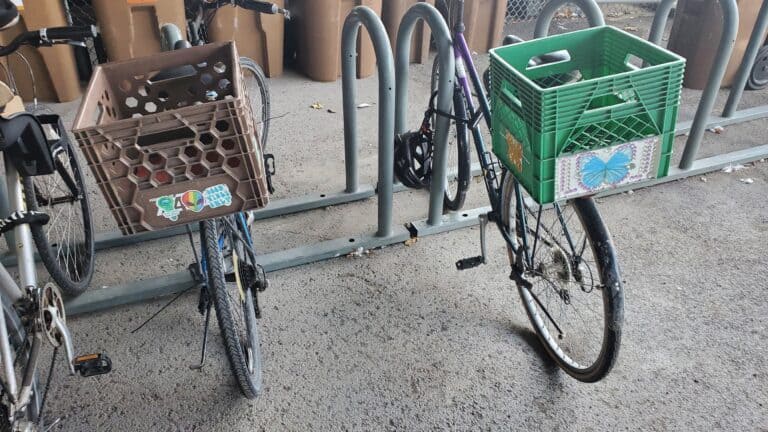What Are Reuse Stores: How Do They Work?
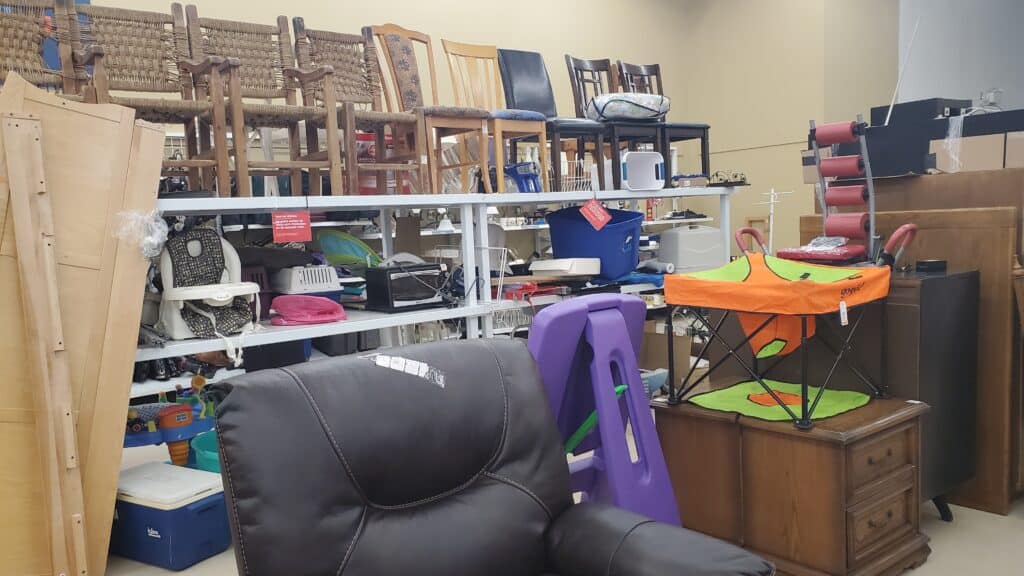
This is a complete guide you’ll ever need to reuse stores in 2023.
I used the same information to help me understand what are reuse stores and how reuse centers operate.
So if you want to reduce waste and save money, you will love this post.
Let’s get straight to it.
What are reuse stores and their operations
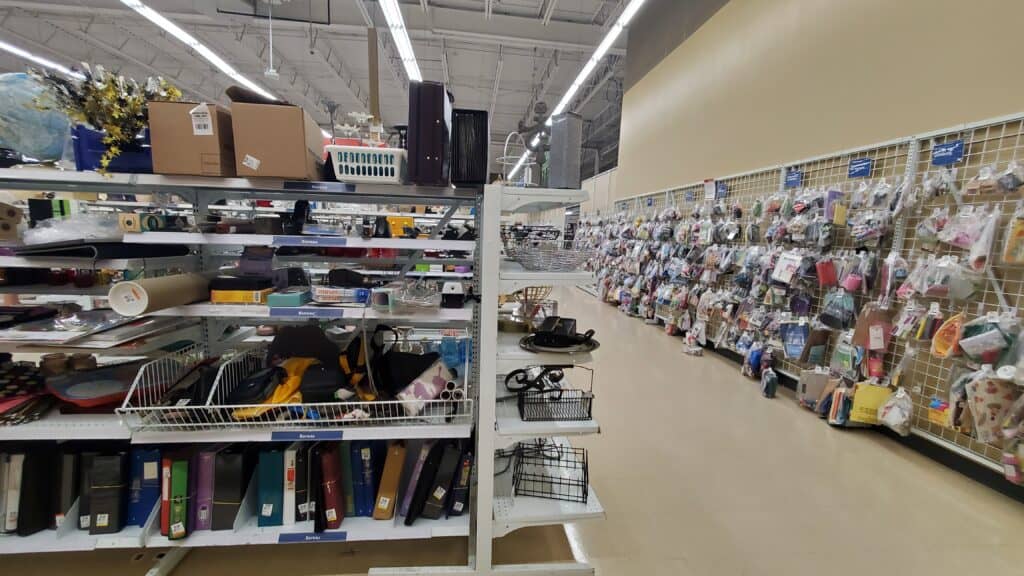
Comparison to thrift stores and second-hand markets
The terms reuse store, thrift store, and second-hand market are often used interchangeably. Here, are some differences worth noting:
- Reuse stores generally specialize in reselling a wide range of items, including building materials, furniture, electronics, and more.
- Thrift stores, on the other hand, are often associated with charitable organizations and focus primarily on reselling donated items to support their causes.
- Second-hand markets encompass various avenues for buying and selling pre-owned goods, including online platforms and local community events.
What sets reuse stores apart is the emphasis on sustainability and commitment to the circular economy.
These stores typically have a specific focus on promoting zero waste, the reuse of goods and diverting them from landfills.
Reuse stores often have a broader range of items available compared to thrift stores and second-hand markets.
Similarities of reuse stores, thrift stores, and second-hand market
- These stores prevent perfectly usable goods from being discarded prematurely.
- Rather than throwing these items away, they become available for purchase by others who may find value in them.
- They promote the principles of zero-waste, reduce, reuse, and recycle.
- They offer an alternative to the linear model of production and consumption.
- You get quality products at affordable prices.
- They will all accept donations if you want to declutter your home responsibly.
Types and Items Found in Reuse Stores
Not all reuse stores are the same.
Some may specialize in one area or the other. Others may sell depending on donated items. Always check the type of reuse store before you visit.
Below are some of the most common types of reuse stores.
- Home goods and furniture reuse stores
- Building materials for construction and home improvement projects
- Creative reuse and art supplies
- Kitchenware and Household Items
1. Home goods and furniture reuse stores
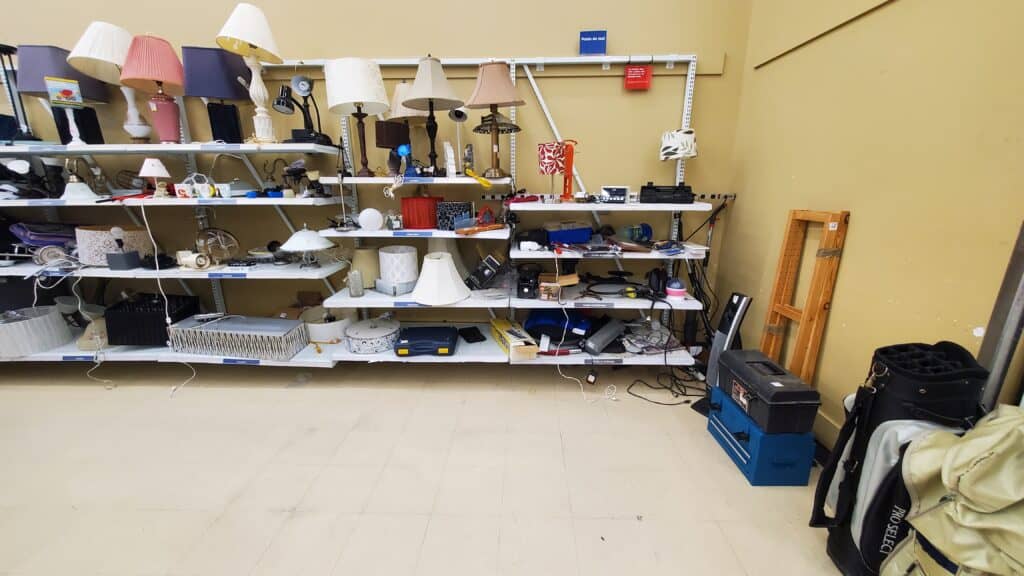
Before I buy any home furniture, I visit a local reuse store to see what is available.
Reuse stores are treasure troves where you can find affordable home goods and furniture.
From sofas and dining tables to lamps and decorative items, these stores offer a wide range of options to furnish and beautify your living space.
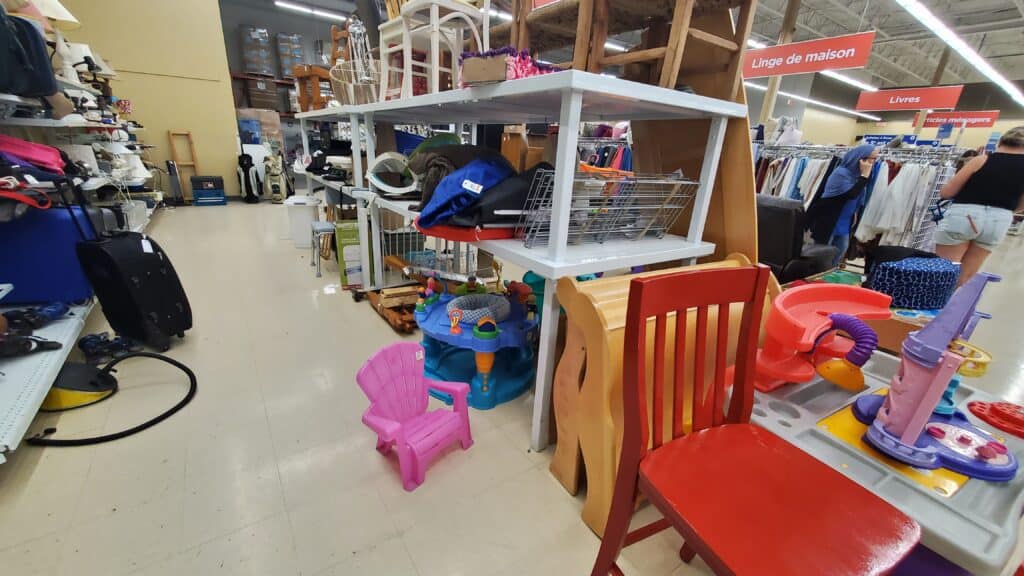
List of items I often find in a second-hand store:
- Sofa
- Dining table and chairs
- Coffee table
- Bed frame
- Nightstand
- Bookshelf
- Desk
- Armchair
- TV stand
- Side table
- Mirrors
- Lamps
- Wall art and decor
- Shelving units
- Cabinets and storage solutions
- Outdoor furniture (e.g., patio chairs, tables)
- Baby cribs and nursery furniture
- Mattresses (check for gently used options)
- Bar stools and counter chairs
- Accent chairs
- Vintage or antique furniture pieces
- Home accessories (e.g., vases, picture frames, decorative items)
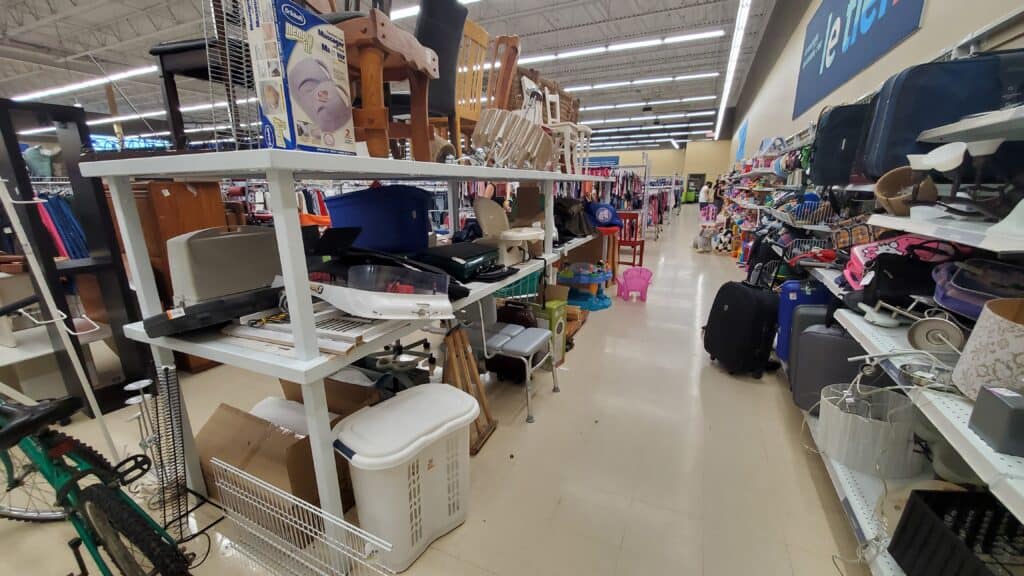
2. Building materials for construction and home improvement projects
Reuse stores are not just for finding home decor and furniture; they are also valuable resources for those undertaking construction and home improvement projects.
Some of these materials have a packaging defect or are simply surplus from the retailers.
Local improvement stores like Habitat ReStore offers the following:
- Kitchen cabinets
- Bathroom fixtures (sinks, toilets, showers)
- Appliances (stoves, refrigerators, dishwashers)
- Doors (interior and exterior)
- Windows
- Flooring materials (tiles, hardwood, laminate)
- Lighting fixtures
- Paint and painting supplies
- Plumbing fixtures (faucets, sinks, pipes)
- Electrical components (outlets, switches, wiring)
- Furniture (tables, chairs, sofas)
- Home decor items (vases, picture frames, artwork)
- Building materials (lumber, plywood, drywall)
- Tools (hand tools, power tools)
- HVAC systems and components
- Landscaping materials (pavers, garden tools)
- Hardware (knobs, hinges, screws)
- Roofing materials (shingles, tiles)
- Insulation
- Flooring accessories (trim, baseboards)
- Fireplaces and mantels
- Garage doors
- Cabinets and storage solutions
- Decking materials
- Home improvement supplies (caulking, adhesives, sealants)
3. Creative reuse and art supplies
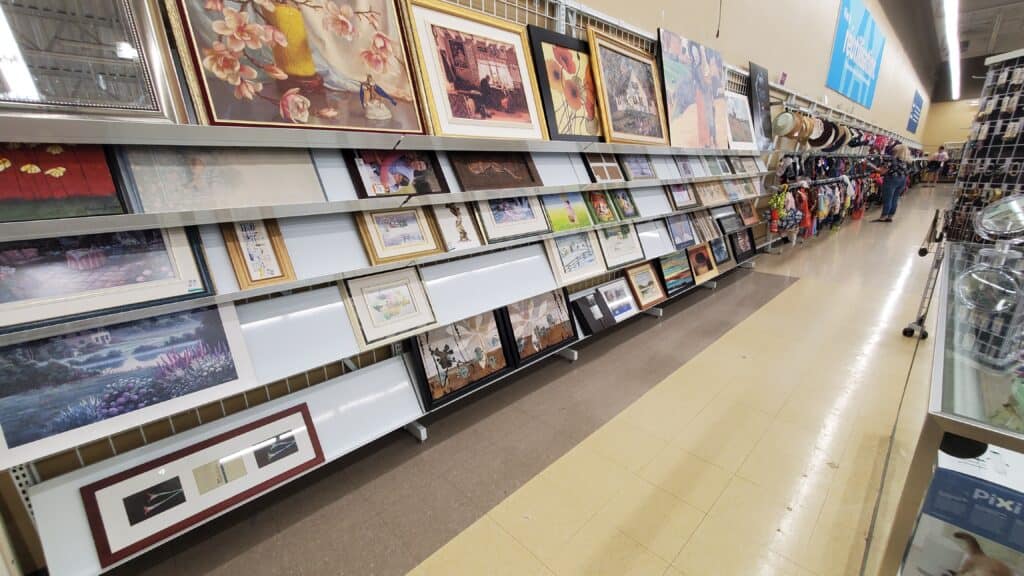
Reuse stores are havens for artists, crafters, and DIY enthusiasts.
You will find dedicated sections for art supplies and materials without breaking the bank.
- Paintbrushes
- Canvases (new or gently used)
- Acrylic paints
- Watercolor paints
- Oil paints
- Colored pencils
- Sketchbooks
- Craft paper
- Scrapbooking materials (patterned paper, stickers, embellishments)
- Beads and jewelry-making supplies
- Fabric remnants
- Sewing notions (buttons, threads, zippers)
- Yarn and knitting needles
- Crochet hooks
- Embroidery thread and hoops
- Clay and sculpting tools
- Wood scraps for woodcraft projects
- Stencils and stamps
- Glues and adhesives
- Decoupage materials
- Mosaic tiles and grout
- Calligraphy pens and ink
- Pastels (soft and oil)
- Printmaking supplies (brayers, linoleum blocks)
- Spray paint
- Picture frames (to be upcycled or used for art display)
- Origami paper
- Collage materials (magazines, old books, fabric scraps)
- Paper cutters and trimmers
- Rubber stamps and ink pads
- Craft scissors and punches
- Embellishments (rhinestones, sequins, feathers)
- Mixed media supplies (gel medium, gesso, texture paste)
4. Kitchenware and Household Items
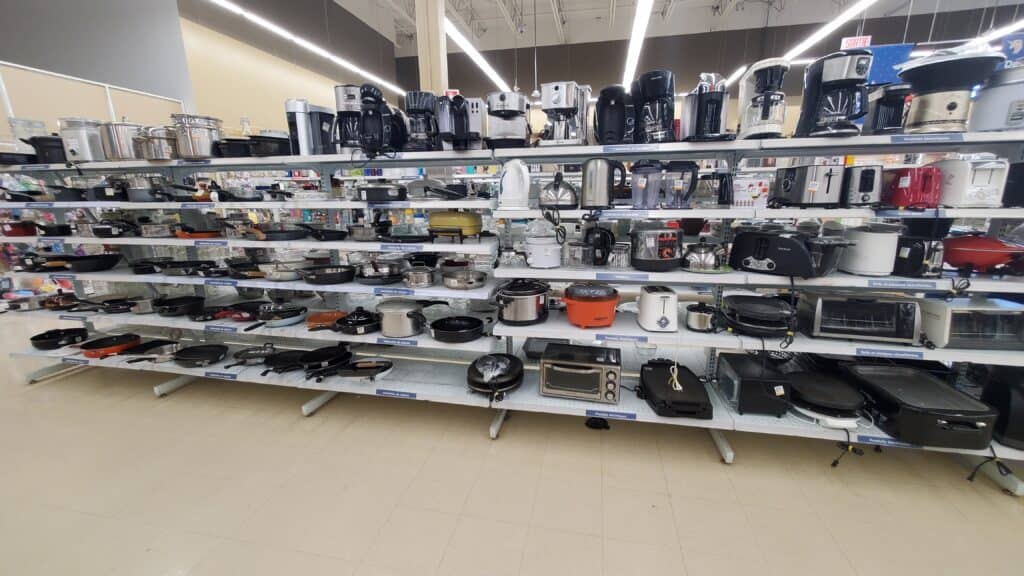
If you are looking for new kitchenware and household items, like cookware or utensils, try looking into a nearby reuse store.
You will be surprised by what you will discover.
Let me give you a list of what you could find:
- Plates
- Bowls
- Cups and mugs
- Cutlery (forks, knives, spoons)
- Pots and pans
- Baking sheets and pans
- Mixing bowls
- Glassware (glasses, wine glasses)
- Cookware sets
- Small kitchen appliances (toasters, blenders, coffee makers)
- Utensil sets (spatulas, tongs)
- Food storage containers (plastic or glass)
- Canisters and jars
- Serving trays and platters
- Measuring cups and spoons
- Cutting boards
- Oven mitts and pot holders
- Dish drying racks
- Dish drainers and racks
- Kitchen scales
- Colanders and strainers
- Graters and slicers
- Mixing spoons and whisks
- Bakeware (cake pans, muffin tins)
- Tea kettles
- Food processors and choppers
- Slow cookers and Crock-Pots
- Roasting pans
- Glass baking dishes
- Salt and pepper shakers
- Napkin holders
- Trivets and hot pads
- Ice cube trays
- Salad spinners
- Pitchers and carafes
- Spice racks and organizers
- Food thermometers
- Timer
- Kitchen towels and aprons
- Dish soap dispensers
- Sponges and scrub brushes
Environmental and Social Impact of reuse stores
- When you buy from reuse stores you play your part in reducing landfill waste by diverting usable items from ending up in the trash.
- Reuse stores actively promote recycling by accepting items that may not be suitable for resale.
- They often have partnerships with recycling facilities and ensure that materials such as metal, glass, plastic, and electronics are properly recycled.
- By choosing to shop at reuse stores, you actively support eco-friendly practices.
- Every purchase you make from a reuse store is a conscious decision to reduce the demand for new products.
- Contractors and individuals undertaking building projects can donate their surplus materials to these stores.
- Reuse stores may donate furniture or household items to shelters or transitional housing programs to help individuals and families in need.
Reuse stores by country
USA:
- Goodwill
- Habitat ReStore
- Salvation Army Thrift Stores
- Savers
- ReSOURCE
- Second Use Building Materials
- Stardust Building Supplies
- Community Forklift
- The Loading Dock
Canada:
- Value Village
- Salvation Army Thrift Stores
- Goodwill
- Habitat ReStore
- Talize
- Reuse Centre
- Junk in the Trunk
UK:
- Oxfam
- British Heart Foundation Furniture & Electrical
- Hopeworx
- Scope (To donate and recycle used disability equipment)
- Sue Ryder
- Newbury Community Resource Centre
- Furniture Helpline
- FurnitureNow
- Impakt Housing
- Furniture Recycling Project
- Richmond Furniture Scheme
- TCL Reuse Centre
- The Re-Use Partnership
- Furniturelink Surrey
- Cambridge Re-Use
- Reuse Community Project CIC – Reuse MK
BONUS: Reuse Network
New Zealand:
- Recycle Boutique
- Hospice Shops
- SaveMart
- Salvage Shop
- ReStore
- EcoShop
- Op Shop (Opportunity Shop)
- Recycled Boutique
- Tī Kouka Vintage & Resale
- The Recycler
Australia:
- Salvos Stores
- Vinnies
- Lifeline Shops
- The Smith Family Stores
- Red Cross Shops
- Brotherhood Community Stores
- Anglicare Op Shops
- RSPCA Op Shops
- Save the Children Op Shops
- Trash & Treasure Markets
France:
- Emmaüs
- Le Relais
- La Ressourcerie
- Le Grenier
- Les Amis d’Emmaüs
- Le Recycleur Solidaire
- Le Spoutnik
- Le Fripier
- Le Hangar
- Emmaüs Défi
Belgium:
- Les Petits Riens
- Oxfam Solidarité
- Spullenhulp/Vincentius
- Terre
- Les Ateliers de la Rue Voot
- La Boutique Solidaire
- Pêle-Mêle
- Ressourcerie du Pays de Liège
- Le Rayon Vert
- Kringwinkel
Italy:
- Mercatino dell’Usato
- Croce Verde Apuana
- Comunità Nuova Vita
- Cassiodoro
- Mercatino Solidale
- Associazione Insieme
- Mercatopoli
- Bazaar EcoSolidale
- Circolo Ricreativo Officina Riutilizzo
- Cooperativa Rinascita
Sweden:
- Myrorna
- Emmaus Björkå
- Loppis Second Hand
- Röda Korset Butik
- Myrtopia
- Erikshjälpen Second Hand
- Mellringe Second Hand
- Sallys
- Human Bridge
- Återbruket
Netherlands:
- Kringloopwinkel Het Goed
- Rataplan
- Leger des Heils
- Emmaus
- Dorcas Winkels
- Terre des Hommes
- Vintage Rebel
- Het Warenhuis
- Kringloopcentrum Baarn
- De Groene Ezel
Did I Miss Anything?
Let me know by leaving a comment below right now.

